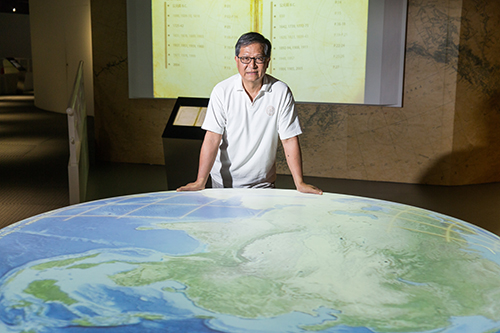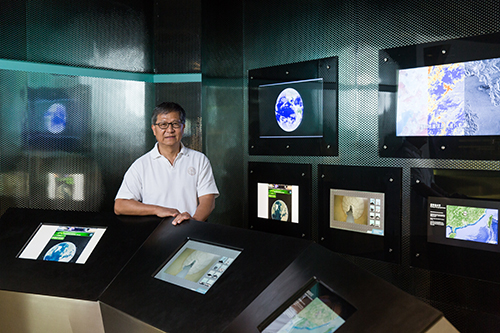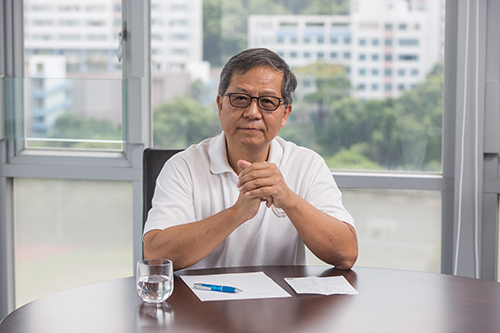Climate Change: Science and Attitude

“Mother Earth will strike back if we ignore the climate change crisis—the consequences will be brutal.”
Mr Leung Wing-mo opened a new chapter of life after retiring from his position as Assistant Director of the Hong Kong Observatory. With plenty of professional experience and knowledge, he travelled around the world to investigate the impacts and challenges brought about by climate change.
“The biggest challenge when filming the Meteorology Series (a television documentary series) is that we could not prepare the scripts in advance. The director had never been to those places, so he had only a vague idea of what to do. He asked me to how to convey certain messages, and I had to come up with appropriate expressions based on what I had seen and my scientific background. This was rather difficult, so I was relieved to hear the director was satisfied with my performance,” Mr Leung said.
He said the filming experience enriched his life. Many of the places they visited, such as Tianshan, glaciers and the Pacific island of Kiribati, are far from ordinary vacation locations, but Mr Leung considered it a rewarding experience.
The Observatory recorded a minimum temperature of 3°C on 24 January 2016, the coldest day in nearly 60 years and the sixth lowest on record. Mr Leung explains, “Data analysis of global warming involves temperature trends over decades and even centuries. Isolated extreme events, such as an intense cold surge for a day or week, do not change the global trend or disprove global warming.
“Many people, such as Donald Trump (the nominee of the Republican Party in the United States), have made repeated criticisms of global warming, saying America is freezing, so global warming must be a hoax, and the scientists should all be fired. These people are ignorant—they know nothing about climate change and global warming.”
Since retirement, Mr Leung has served as an adjunct professor at a university, a member of the Council for Sustainable Development, and an honorary adviser to the Leisure and Cultural Services Department.
Drawing from his years of experience, Mr Leung understands the power of using simple words to convey complex ideas. Mr Leung explains the possible causes of intense cold surges. “Jet streams are found at higher latitudes and circulate around the poles or polar regions. As the Arctic warms up, its temperature difference with mid-latitudes decreases, affecting the speed of the jet streams. The smaller the temperature difference, the slower the airflow becomes. A simple analogy is a river that meanders when velocity is reduced. As the airflow decelerates, there are more fluctuations southward or northward, bringing more cold air from the Arctic to the south.”

As a scientist, Mr Leung educates the public by objective analysis, explaining clearly the causes and effects of climate change. He says people will make better decisions with a basic understanding of science. “The movement of southward and northward air masses is relatively static. As a result, extreme weather events may last longer than before. For example, a cold surge may continue for several days,” Mr Leung says. “It would be okay for me to stay in icy cold water for two minutes, but then I have to leave. Prolonged weather events will affect more and more people.”
“The evidence of climate change and its dangers is loud and clear. My biggest worry is that we still do not understand fully the science of climate change,” says Mr Leung. “Scientists know that climate change is not a linear phenomenon which can be predicted. Nonlinear dynamics are much more chaotic.”
We are all vulnerable. What can we do in the face of unpredictable disasters?

As an optimist, Mr Leung suggests: “First we have to be optimistic.” He recalled a visit to Queensland, Australia, where he met a farmer who had suffered substantial financial losses because of a drought that had lasted for 18 months. The farmer took it easy, however, pointing out that life has its ups and downs and that things would get better. He was very impressed by the farmer’s positive attitude.
Secondly, Mr Leung urges everyone to equip themselves with knowledge and vision. “We need to develop a global perspective in order to understand the problems and think of possible solutions. The world is ever changing. However, if we constantly enrich our knowledge and collectively change our lifestyle, we will be able to face the challenges posed by climate change—and other circumstances in life.”






